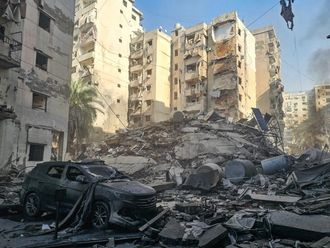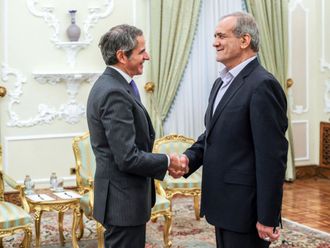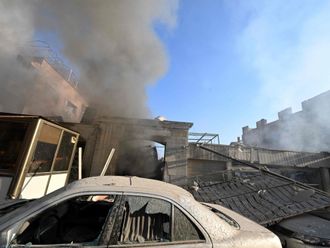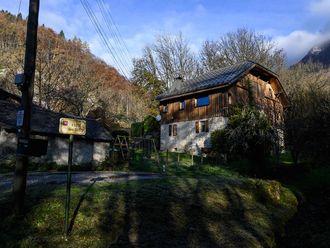BEIRUT: Egypt restricted the ability of Syrians to enter the country on Monday, with officials citing reports that a large number of Syrians were backing the Muslim Brotherhood, which is engaged in a bloody standoff over the military’s ouster of Islamist leader Mohammad Mursi. The decision dealt a blow to Syria’s main Western-backed opposition group that is leading the fight against President Bashar Al Assad from its headquarters in Cairo.
Egyptian authorities began requiring Syrians to get visas before arriving in the country, according to officials and opposition figures, many of whom live in the Egyptian capital.
Veteran Syrian opposition figure Haitham Maleh said he was held up for several hours at the airport in Cairo on Monday before he was allowed entry, an exception made only “after several political sides intervened with Egyptian authorities” on his behalf.
“This Egyptian decision is a reward to Bashar Al Assad for all the Syrians he has killed,” Maleh said from the Egyptian capital on Monday night. Dozens of Syrian families with no money were denied entry, he said, and two planes carrying Syrians were returned to Syria and Lebanon, where they originated.
“I have been living in Egypt for two years. I have an apartment and I have a bank account in Egypt,” he said earlier from the Cairo airport.
Egyptian airport officials said the new measures followed reports that a large number of Syrians in Egypt were backing the Muslim Brotherhood and took part in violence after the ousting of Egyptian President Mohammad Mursi. The airport officials spoke on condition of anonymity because they were not authorised to speak to journalists.
In response, the Syrian National Coalition said it regretted any crimes committed by Syrian nationals in Egypt and said Syrians “must not be punished for individual criminal acts”.
In Syria’s conflict, which pits a rebel movement rife with Islamist groups against Al Assad’s regime, the Syrian branch of the Muslim Brotherhood has played a large role in the attempts to create a leadership in exile. The organisation is a weaker version of Egypt’s Muslim Brotherhood but is still considered the most politically organised Syrian opposition group.
The opposition has found itself on the defensive after a series of setbacks at the hands of Al Assad’s forces, which have been reinforced by Lebanese fighters from the Shiite militant group Hezbollah.
Meanwhile, the ruling Baath Party which has been ruling Syria since 1963 and is seen largely as a front for the Al Assad family’s iron grip rule replaced its ageing leadership, including long-serving Vice-President Farouk Al Shar’a, a close associate and long-time Al Assad loyalist.
Al Shar’a, 73, is considered as a somewhat consensual figure and his name was floated by the Turks last year as a possible figure to lead a transitional administration to end the country’s civil war. Like the majority of Syrians, Al Shar’a is a Sunni. His removal from the Baath Party command may be a move by Al Assad to shore up Al Shar’a’s future chances as a potentially acceptable figure to both sides during a political transition.
Syria’s state run television said the new Baath Party command, which is the party’s top decision-making body, was chosen during a meeting of the party’s central committee.
It published the names of 16 members of the new leadership, which included none of the party’s old leaders except Al Assad.
A senior Baath Party official, Fayez Sayegh, told The Associated Press that the reshuffle, the first since 2005, was meant to “pump in new blood” in the party.
The opposition and Washington dismissed the change.
“This is an attempt to improve the image of the regime,” senior SNC member Abdul Baset Sida said. “But the decision-making group is the same and did not change.”
US State Department spokeswoman Jen Psaki said the US does not recognise Al Assad’s legitimacy. “We continue to ask him to step aside. But we know that we need to find a way to work with all parties to get back to the table,” she said.
Also on Monday, the opposition figure appointed in March and tasked with forming an interim government to administer rebel-held areas resigned, citing his inability to form a government. “I have decided to step down for the general good of the Syrian revolution,” Gassan Hitto said in a statement.
Other opposition members disliked Hitto’s perceived proximity to the Qatari backed Muslim Brotherhood. He had been effectively sidelined since his appointment a result of the rivalry between Qatar and Saudi Arabia, which are vying for influence among the Sunni dominated Syrian opposition. Both countries have been prominent backers of forces struggling to oust Al Assad, but Qatar has recently taken a back seat.
A former Syrian political prisoner with close links to Saudi Arabia, Ahmad Jarba, was elected to lead the coalition on Saturday.
Psaki said the US welcomed his election.
“We hope to make progress together to prevent the total collapse of Syria into chaos and the rebuilding push to rebuild the social fabric,” she said.
Violence also continued on Monday.
Two car bombs exploded a few minutes apart in the predominantly Alawite and Christian neighbourhood of Akrama in the central city of Homs, killing at least four people and wounding 40, according to the state run news agency SANA. Activists confirmed the explosions but had no further details. Nobody claimed responsibility for the attack, but past car bombs and suicide attacks have been blamed on Al Qaida-linked militants who have joined the rebel movement.
Al Assad’s forces have launched a major offensive to retake Homs, a transport hub that sits between the capital, Damascus, and coastal areas overwhelmingly loyal to the regime. Rebels have held on to parts of the city they took more than a year ago but remain under siege.
Forces loyal to Al Assad have pummelled their way into the Khaldiyeh neighbourhood with constant mortar fire and tank shelling, allowing them to gain control of eastern parts of the district, said Rami Abdul Rahman of the British based Observatory for Human Rights, which monitors clashes. He estimated government forces had seized 11 buildings in Khaldiyeh. Overall, he said, the government now controls about 20 per cent of the area.
“They are advancing,” Abdul Rahman said in a telephone interview.











